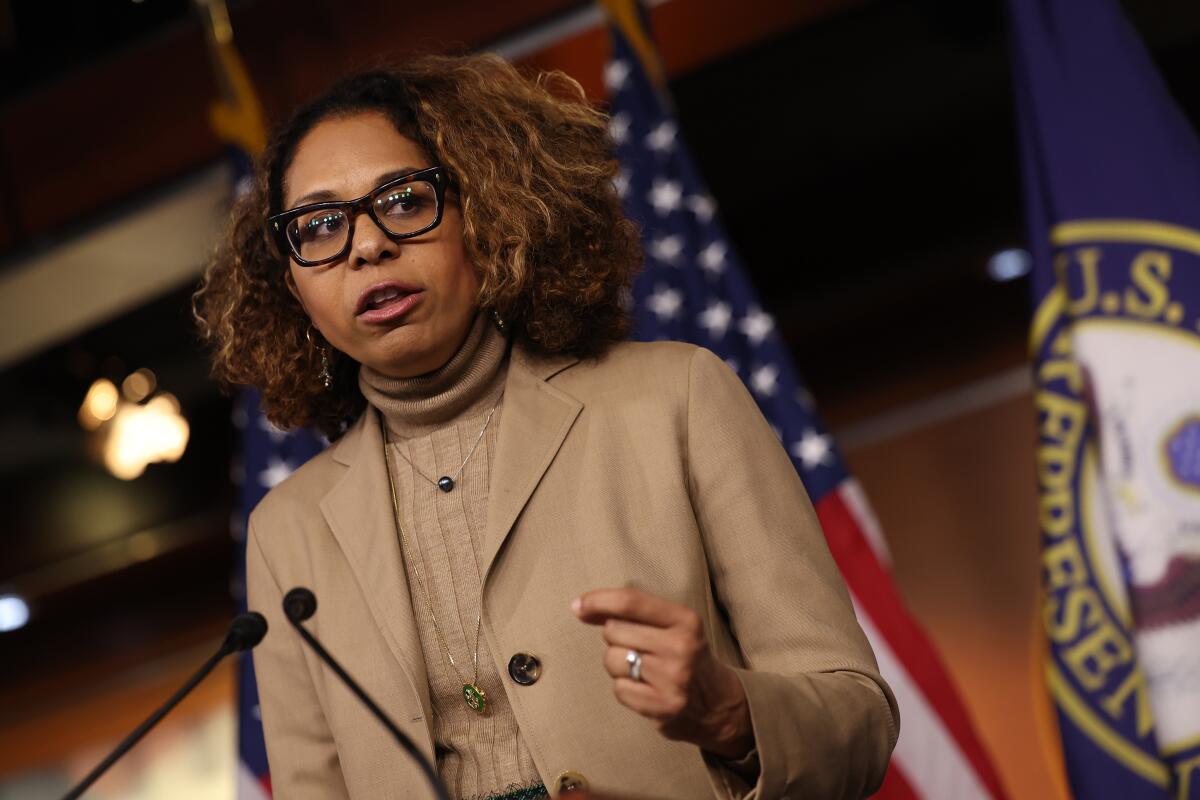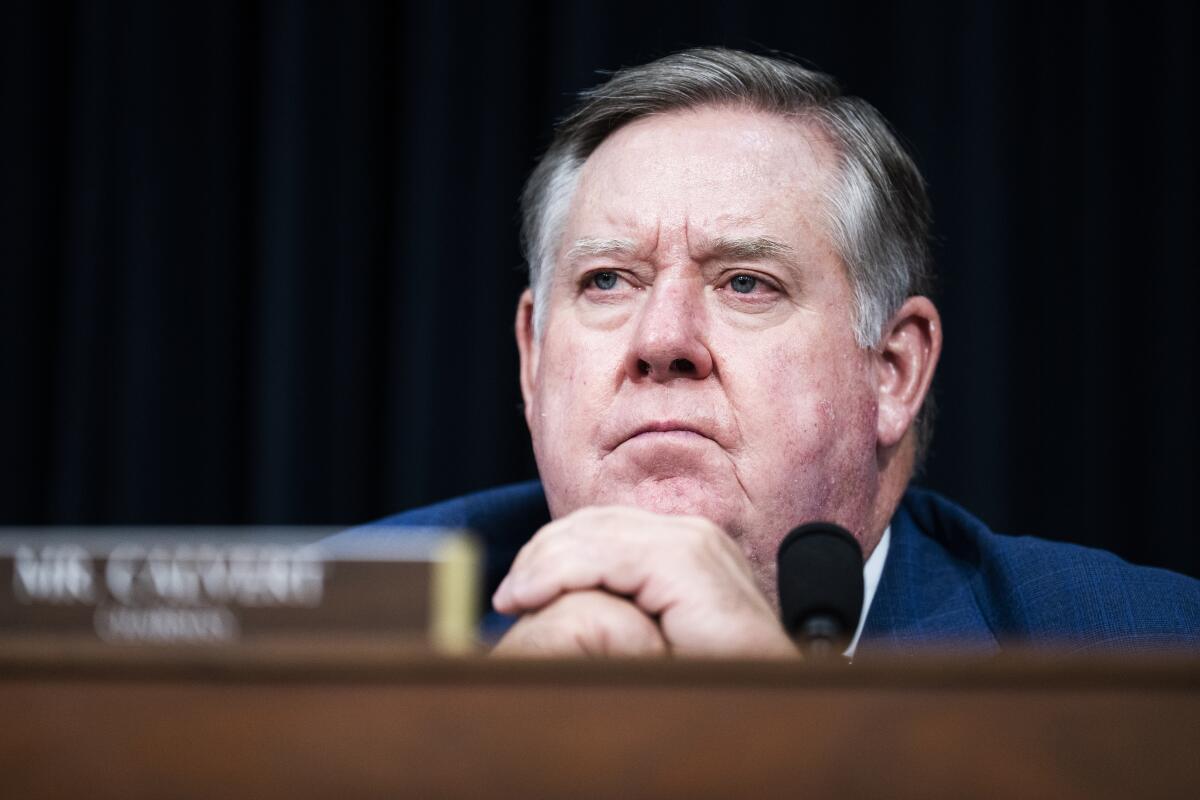After years of partisan feuding, California’s new generation of Congress members tries to get along. Will it work?

WASHINGTON — Over homemade tacos at a Capitol Hill row home, several of California’s members of Congress did something unusual last year: they gathered for a bipartisan, home-cooked meal where politics were not on the menu.
The table full of Republicans and Democrats represented an opening salvo in a push by some of the state’s newest representatives to build collegiality and cross party work in a place that in recent years has supported neither.
“We just sit down and break bread and get to know each other,” said the event’s host, Rep. Jay Obernolte (R-Big Bear Lake), who was elected in 2020. “We try and invite diverse groups of people that don’t know each other or haven’t had an opportunity to even meet and just introduce everyone, no agenda.”
Obernolte said he hosted a similar bipartisan dinner series when he was an assemblyman in Sacramento. After Rep. Sydney Kamlager-Dove (D-Los Angeles) was elected to Congress in 2022, she became his first Democratic co-host in Washington.
“It’s about socializing, and fellowshipping and finding places for common ground,” said Kamlager-Dove, who served in the state Legislature with Obernolte.

There’s no evidence that the bipartisan fellowship has led to bipartisan policy yet. The 40 Democrats and 11 Republicans California voters have sent to the House of Representatives remain closely aligned with their respective parties on most matters.
The 12% of seats Californians hold in the House could be a powerful voting bloc if they chose to stick together, but they rarely do.
“I’m just amazed. We could have so much power to do things that are good for California. And yet, it seems like we abdicate some of that because we don’t get together on a regular basis,” Obernolte said.
The quest for collaboration by a new generation of House members comes at an inflection point for California’s representation in Washington.
For many years, California’s delegation included two of the most powerful and polarizing members of Congress — former speakers Nancy Pelosi (D-San Francisco) and Kevin McCarthy (R-Bakersfield). But their roles as national party leaders are subsiding. Pelosi stepped down from House leadership at the end of 2022 and McCarthy resigned from Congress last year after he was ousted as speaker.
With longtime lawmakers leaving the House, Sen. Feinstein’s death and a Californian no longer holding the speaker’s gavel, the state’s Capitol power is at an ebb.
The delegation also anticipates a flood of retirements from elderly members in the next few terms.
“There’s maybe an opportunity there as there’s a generational shift in the California delegation … to have a fresh look at ways to actually build bridges,“ said Rep. Kevin Mullin (D-South San Francisco), who was elected in 2022.
“There’s some common interests there that wouldn’t necessarily break down along partisan lines.”
If the camaraderie sticks, it would be a big change from the past. California’s congressional delegation has long been “fractious and aggravated,” said Dan Schnur, who teaches political communications at USC, UC Berkeley and Pepperdine.
Part of that may be due to its size.
“Politicians from smaller states are often forced to put aside differences out of sheer necessity. A California member doesn’t feel that obligation,” Schnur said.
Big delegations that do work together can exert a lot of pressure. He pointed to an earthquake research center that New York fought for in the 1980s.
“The difference is the New York delegation decided to work together for it. And the California delegation wouldn’t or couldn’t,” Schnur said.
From the farm towns of the Central Valley to the beaches of Orange County, California is a battleground for control of the House of Representatives.
Keith Smith, an associate professor of political science at the University of the Pacific, said the benefit of the entire delegation working together would be immeasurable, but it’s been tough for California, a state that is geographically, demographically and ideologically diverse.
“Even though it’s the largest delegation in the House of Representatives, the divisions are sufficiently strong that they don’t work together in a way that allows them to flex that power,” he said.
Instead, partisanship has kept the delegation from consistently meeting together for decades, said Rep. Zoe Lofgren (D-San Jose), who heads the state’s Democratic delegation, and her GOP counterpart Rep. Ken Calvert (R-Corona), who have both been in Congress since the 1990s. Both said they weren’t able to attend Obernolte’s dinner party.
Democrats and Republicans are too far apart on policy to warrant routine meetings for the sake of meetings, Lofgren said. Though she has asked for regular meetings with California’s GOP members many times over the years, Lofgren said she forgot to ask at the start of this Congress.

“There’s very strong disagreement among all of the Republican members versus all of the Democratic members,” Lofgren said. “On choice, and on practically everything.”
California’s representatives still team up to help the state even though they’re not socializing, she said, pointing out that the delegation frequently comes together to push the White House for disaster aid.
“You don’t have to have a meeting to make that happen. We do letters, we’ve done phone calls, we’ve done zooms. We could do a sit-down but it hasn’t proven necessary,” Lofgren said.
Even that has been tested at times though. The delegation couldn’t come together in 2019 when then-President Trump threatened to withdraw disaster aid to California as it recovered from the Camp Fire, the deadliest and most destructive wildfire in the state’s history.
Republicans rejected Lofgren’s invitation for an all-delegation meeting in a letter stating they were “confident that we can prevail upon the president.”
Calvert said members work across party lines on regional issues within the delegation, but the longtime frostiness between California’s Republican and Democratic representatives is a matter of “philosophical differences.” He said social events like Obernolte’s dinner, rather than policy focused meetings, might be the way to build bridges.
“There’s probably members of the California delegation that haven’t even talked to each other,” he said.
More to Read
Get the L.A. Times Politics newsletter
Deeply reported insights into legislation, politics and policy from Sacramento, Washington and beyond. In your inbox three times per week.
You may occasionally receive promotional content from the Los Angeles Times.













